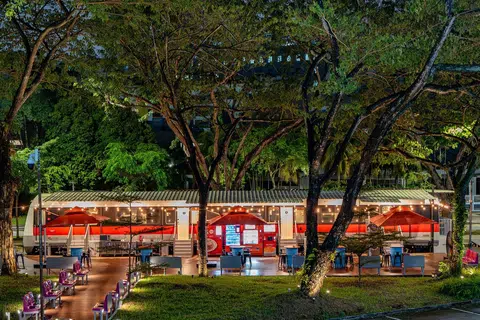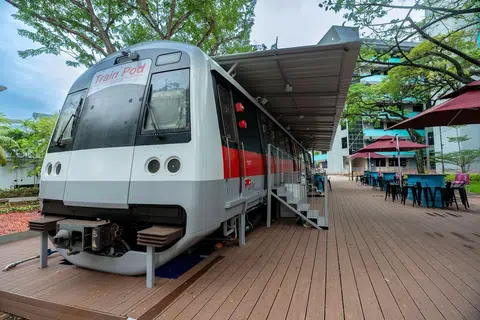Decommissioned MRT train becomes S'pore's first train hotel
A decommissioned MRT train has been transformed into a hotel - the first such concept in Singapore - complete with the original train interior, and real-life footage of the train's earlier journeys screened on display panels.
The train hotel will be open for bookings in the second half of 2025.
Train Pod @ one-north has eight rooms, each measuring about 7.5 sq m, housed in a carriage from a third-generation Kawasaki-Nippon Sharyo C751B train, which is among the trains that plied the North-South and East-West lines from 2000 to 2024.
It was officially launched on April 11 by Ms Low Yen Ling, Senior Minister of State for Trade and Industry, and Culture, Community and Youth.
At Train Pod @ one-north, each air-conditioned room in the train carriage is equipped with a single bunk bed that can accommodate two guests, as well as an en-suite bathroom.
Outside the train carriage, guests have access to common amenities such as a vending machine for food and drinks, a coin-operated washing machine and dryer, an outdoor kitchen and a fridge or freezer.
They can also use the outdoor dining area, furnished with original MRT train seats and bicycle racks.

Room rates will be around $80++ to $90++ on weekdays, and $100++ to $120++ on weekends.
Train Pod @ one-north is created by local start-up Tiny Pod and supported by JTC Corporation. It is an extension of Tiny Pod's existing pop-up shipping container hotel at LaunchPad @ one-north - another example of how the company transforms existing structures into functional spaces.
Tiny Pod's shipping container hotels were launched in 2020, and have since expanded to urban and public spaces at Gardens by the Bay and Haw Par Villa.
In December 2023, a resort hotel with rooms made from old public buses was launched. The Bus Collective, located next to Changi Village Hawker Centre, was created by travel agency WTS Travel, which partnered the Ministry of Trade and Industry and the Singapore Land Authority.
Original parts of the buses - including windows, driver seats and steering wheels - were retained as features of the rooms.
Ms Low said that innovative ground-up business ideas, like the co-living train hotel, "exemplify how thinking differently about using decommissioned assets can create extraordinary and sustainable possibilities".
The train was decommissioned in May 2024, and one of its carriages was donated to Tiny Pod.
It took around $300,000 and eight months of work to refurbish the train carriage, which was transported by a trailer from train operator SMRT's Tuas Depot to JTC's LaunchPad @ one-north. Two heavy-duty cranes were used to lift the train car into position.

Tiny Pod and JTC added that other parts of the train have been reused, with the train seats being converted to park benches and the driver's seat retained as part of the hotel.
The concept behind the co-living train hotel was announced in April 2024, after renovation work started in March 2024.
Mr Seah Liang Chiang, founder of Tiny Pod, said that the appeal of Train Pod @ one-north lies in its blend of nostalgia, sustainability and novelty.
Train Pod @ one-north is a temporary structure, and is currently allowed to operate in its current spot for up to seven years.
When asked about plans for it, Mr Seah said Tiny Pod is open to expanding the concept if public response and occupancy rates are strong.
He added that there is potential to add more decommissioned train carriages to the site, but it is dependent on key factors such as the availability of decommissioned trains, customer demand, land availability and regulatory approvals.
Not every location can accommodate a train carriage, due to space constraints or land use restrictions.
But Mr Seah said: "We are currently exploring a few potential sites, including under-utilised state land or industrial areas with interesting character and accessibility."
Esther Loi for The Straits Times